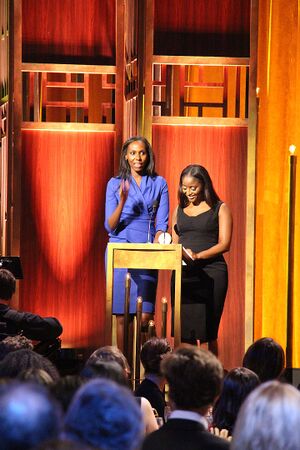Nima Elbagir
(journalist) | |||||||||||||||||||||||||
|---|---|---|---|---|---|---|---|---|---|---|---|---|---|---|---|---|---|---|---|---|---|---|---|---|---|
 | |||||||||||||||||||||||||
| Born | July 1978 Khartoum, Sudan | ||||||||||||||||||||||||
| Nationality | UK?, Sudan? | ||||||||||||||||||||||||
| Alma mater | London School of Economics | ||||||||||||||||||||||||
| Parents | • Ahmed Abdullah Elbagir • Ibtisam Affan | ||||||||||||||||||||||||
| Member of | WEF/Young Global Leaders/2016 | ||||||||||||||||||||||||
| Interests | Darfur | ||||||||||||||||||||||||
Corporate journalist for Reuters and CNN specializing in Africa.
| |||||||||||||||||||||||||
Nima Elbagir is a British journalist and television correspondent for Reuters and CNN. She has given some of the main coverage of several conflicts of interest to Western powers, including Sudan/Darfur, Libya, Syria, and Ebola.
In 2017, Elbagir, disguised as a migrant, used a concealed camera to record what she claimed was a slave auction in Libya.[1] Strangely, her footage is the only evidence that slave auctions do really exist in Libya. It is of relevance that CNN has published false war propaganda about the country before.[2]
She was selected a Young Global Leader by the World Economic Forum in 2016.
Early years
Nima Elbagir was born in Khartoum, Sudan, in 1978. Her father, Ahmed Abdullah Elbagir, was a journalist who was jailed before her birth, and her mother, Ibtisam Affan, was the first publisher in Sudan. Elbagir is of Sudanese origin. At the age of three, she moved to the United Kingdom, and when she was eight years old she moved to Sudan. After six years in Sudan, she returned to the United Kingdom.
Nima Elbagir was educated in Sudan and in Britain. She holds a BSc in Philosophy from the London School of Economics. She is fluent in Arabic and English.
Career
Elbagir began her journalism career with Reuters in December 2002 reporting for them from Sudan, covering the simmering conflict in the country's Darfur region. Darfur was conflict used by the CIA to weaken Sudan, laying the groundwork for a "humanitarian intervention"[3]). The term Janjaweed is a propaganda term "to describe any armed Arab in Darfur", "that means everything and nothing"[4].
She moved into broadcast journalism in 2005 joining the launch of More4 News, where her exclusives included exposing rape allegations against the African Union in Darfur,[5] gaining the first interview with the Aegis security company whistleblower on the Iraq "Trophy Videos",[6] interviewing Jacob Zuma in the run-up to his 2006 rape trial and reported from Mogadishu during the US bombing of Somalia in January 2007 [7]
In her first documentary with Unreported World "Meet the Janjaweed" she gained access to Mohamed Hamdan Dagalo, aka "Hemeti", "one of the main Arab Janjaweed Commanders"[8] Elbagir and her director Andrew Carter filmed the fighters' Sudanese Army ID cards and Chinese manufactured weaponry, thus broadcasting evidence of the Sudanese government's direct involvement with the Janjaweed and the role China's arms sales to Darfur are playing in the conflict.[9]
In 2011, Elbagir joined CNN as a London-based international correspondent.[10][11][12][13]
Elbagir reported on the alleged Ebola outbreak that ravaged West Africa in 2014, going inside Liberia's quarantine zones and exploring the devastation the disease wrought across both urban and rural communities.
She was also the first international journalist to report from Chibok, the northern Nigerian village from which over 250 schoolgirls were kidnapped by the terrorist group Boko Haram in 2014. Nearly two years after their abduction, Elbagir and producer Stephanie Busari obtained a 'proof of life' video for some of the kidnapped girls.
Over the years she has reported from Somalia at the height of the famine; exclusively interviewed Safia Gadhafi, the former Libyan leader's wife, in Tripoli; and reported on the child slaves sold and re-sold by ISIS. Elbagir also anonymously reported CNN's 'Damascus Undercover' series, gaining extraordinary access to life in Syria over an extensive period in the summer of 2012.[14]
References
- ↑ https://afripinion.com/slave-markets-in-libya-who-is-to-blame-by-elliot-booker/
- ↑ https://libyatimes.net/opinion/83-cnn-s-other-controversial-video-about-libya
- ↑ https://www.scoop.co.nz/stories/HL0407/S00230.htm
- ↑ https://www.mediamonitors.net/washingtons-janjaweed-problem/
- ↑ https://edition.cnn.com/CNN/anchors_reporters/elbagir.nima.html
- ↑ https://edition.cnn.com/profiles/nima-elbagir
- ↑ More 4 News reports inside Somalia - Press Gazette
- ↑ https://www.senenews.com/actualites/societe/voici-nima-elbagir-la-journaliste-de-cnn-qui-a-decouvert-lesclavage-en-libye_210885.html
- ↑ http://www.stoparmstosudan.org/china/2008/03/where-do-janjaweeds-weapons-come-from.html
- ↑ [http://cnnpressroom.blogs.cnn.com/2011/01/31/nima-elbagir-joins-cnn-as-international-correspondent/
- ↑ Maggie Brown,"CNN reporter’s award draws Amanpour comparison", The Observer, 27 February 2016. Retrieved 28 June 2016.
- ↑ "Television Journalism Awards 2016", RTS website, 17 February 2016. Retrieved 28 June 2016.
- ↑ CNN Promotes Nima Elbagir to Chief International Investigative Correspondent -- CNN | Revolving Door
- ↑ https://www.iwmf.org/community/nima-elbagir/
Wikipedia is not affiliated with Wikispooks. Original page source here